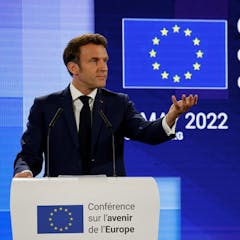
Articles on François Mitterrand
Displaying 1 - 20 of 25 articles

Opposition forces in France are using the president’s unpopularity to push for a new constitution. It’s a dangerous game.

Inspired by François Mitterrand’s idea of a European confederation, French president Emmanuel Macron has outlined the idea of a political body that would be separate from the EU.

Charles de Gaulle created a system where a surprise candidate can upend the presidential elections in France. Will it happen in 2022?

Despite a ‘major breach of trust,’ the recent spat between France and the US corresponds to a long cycle of conflict and rapprochement between the two countries.

It will take time for Rwandans, especially those who suffered or witnessed the genocide, to trust France again.

Using the physical representation of a public figure to provoke an emotional response and encourage a certain action is a well-known strategy. Can it work for the COVID-19 vaccine?

The former president advocated an ‘advanced liberal society’ in which the state must promote growth and paved the way for Europe.

A look back at the distinguished career of the former president, an ardent defender of France’s place in the world.

Relations between the UK and France are often portrayed as a history of at best mutual suspicion and at worst open hostility..

The fire that devastated the Notre-Dame de Paris cathedral on April 15 is a historic event that reminds us of the symbolic power of national monuments.

While the euro’s survival for two decades is evidence of its success, it was born with fundamental problems that have weakened it, leading to near-constant crisis.

With some “Gilet jaune” protestors calling for the removal of Emmanuel Macron, the French constitution is being criticized anew for concentrating too much power in the hands of the president.

Macron’s portrait and taste in literature are full of political symbols to be sussed.

The French must choose between two visions – one from Macron that looks externally to EU partners in trade and security, or one from Le Pen that closes France’s borders and yearns for a ‘Frexit’.

With just 6% of the vote, the French socialist party of outgoing president François Hollande came a distant fifth in the French election.

The most unpopular president of the fifth republic won’t be seeking a second mandate.

He’s only Mr Nobody to people who haven’t being paying attention.

With its share of the vote rising with each election, can the extreme-right party take power on its own? The example of the French communists during the postwar boom suggests otherwise.

French and African presidents have, in the past, entertained close relationships outside official channels. These often included illegitimate exchanges. But there are signs that this is changing.

Legislation is passed in France that would see state surveillance powers scale towards those in the US and UK.
